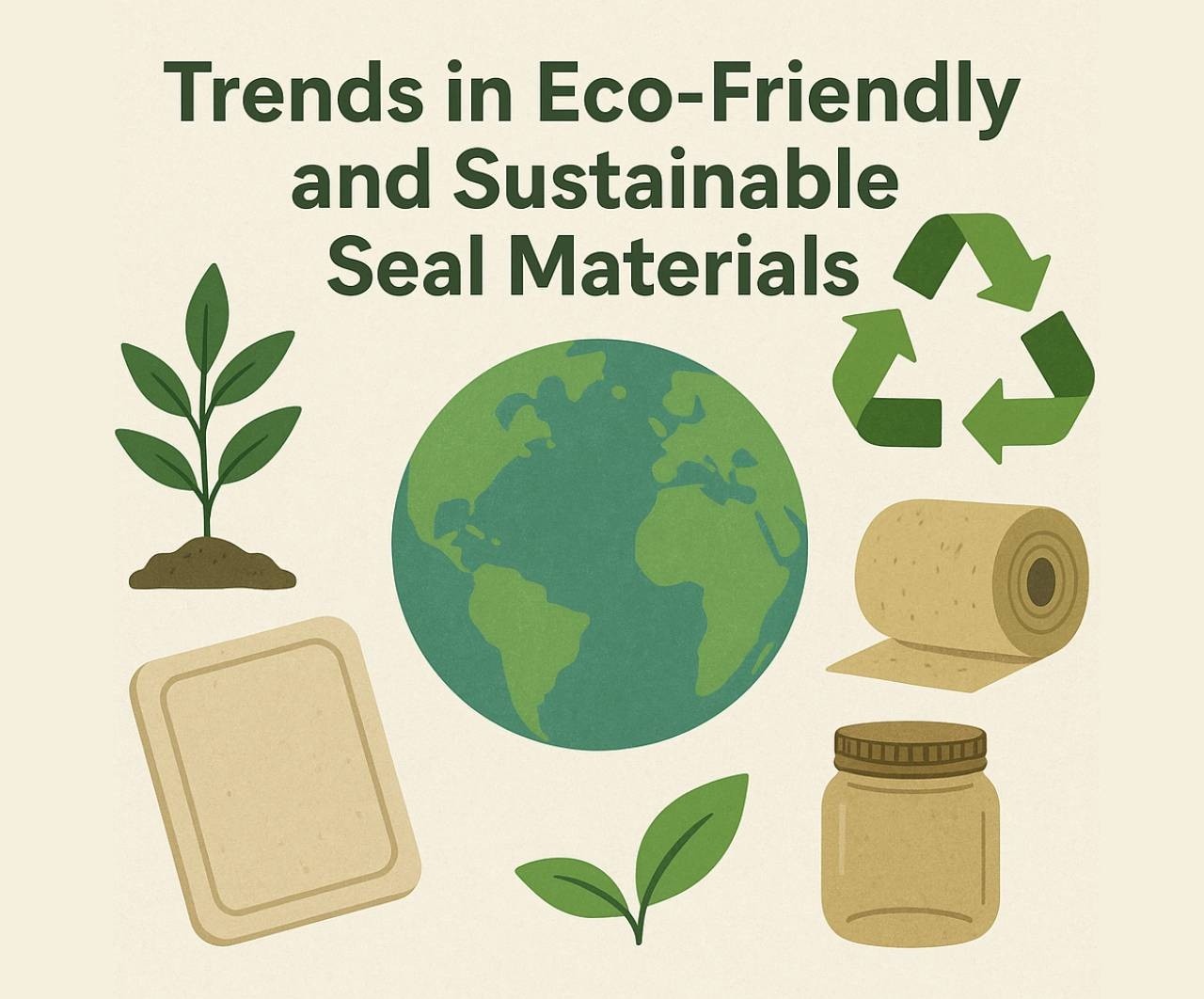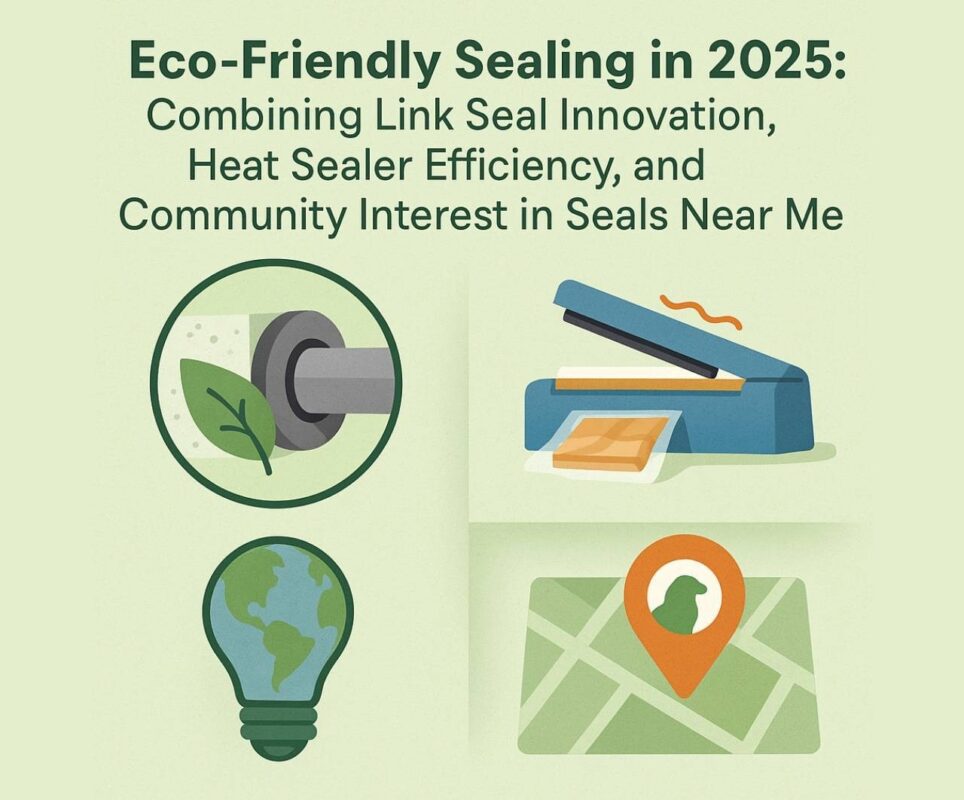In today’s rapidly evolving industrial landscape, companies are increasingly prioritizing environmental responsibility without compromising performance. This shift is evident in the sealing industry, where eco-friendly seal materials, sustainable sealing solutions, and green industrial seals are taking center stage. These innovations are not only reducing environmental impact but also enhancing efficiency, durability, and reliability in industrial applications. For businesses looking to stay ahead, understanding the trends in sustainable sealing technology is crucial. In this article, we explore the latest developments in eco-friendly and sustainable seal materials, the benefits they offer, and what the future holds for green industrial seals. Know more..
The Rise of Eco-Conscious Manufacturing
Global industries are facing mounting pressure to adopt environmentally responsible practices, from reducing carbon footprints to minimizing waste. Eco-friendly seal materials are part of this movement, designed to meet stringent environmental standards while maintaining high performance in demanding industrial environments. Traditionally, seals were manufactured using petroleum-based rubbers and plastics, which posed significant environmental hazards at every stage—from production to disposal.
Now, with innovations in material science, companies are shifting toward biodegradable, recyclable, and low-emission alternatives. These sustainable sealing solutions not only help reduce environmental impact but also improve workplace safety and compliance with global regulations such as REACH and RoHS.
Popular Eco-Friendly Seal Materials
Several materials are gaining traction in the market for their eco-friendly properties. These include:
1. Bio-Based Polymers
Derived from renewable resources such as corn, sugarcane, or soy, bio-based polymers are replacing traditional synthetic rubbers in many applications. These materials offer similar durability, flexibility, and resistance to temperature fluctuations while being biodegradable, making them a cornerstone of green industrial seals.
2. Recycled Rubber and Elastomers
Using recycled components reduces waste and conserves natural resources. Recycled elastomers can be repurposed from old tires, gaskets, or industrial scrap, maintaining high performance while contributing to a circular economy.
3. Thermoplastic Elastomers (TPEs)
TPEs combine the benefits of plastic and rubber, providing excellent resilience and chemical resistance. Their recyclable nature makes them an ideal choice for sustainable sealing solutions, especially in industries like automotive, manufacturing, and renewable energy.
4. Fluoropolymer Alternatives
Traditional fluoropolymers are highly effective but environmentally challenging due to their persistent chemical structure. New eco-friendly formulations now reduce harmful emissions and can be processed with lower energy consumption while maintaining critical chemical resistance and sealing performance.
Advantages of Sustainable Sealing Solutions
Adopting eco-friendly seal materials and green industrial seals offers a range of benefits beyond environmental compliance. Key advantages include:
Reduced Carbon Footprint
Using renewable or recycled materials significantly reduces greenhouse gas emissions during manufacturing and disposal, helping industries meet sustainability goals.
Enhanced Lifecycle Performance
Many sustainable seal materials are designed to resist wear, corrosion, and extreme temperatures, often extending the lifespan of equipment and reducing maintenance needs.
Regulatory Compliance
Governments worldwide are implementing stricter environmental regulations. Using sustainable sealing solutions ensures compliance with standards like REACH (Registration, Evaluation, Authorisation, and Restriction of Chemicals) and RoHS (Restriction of Hazardous Substances), protecting companies from fines and reputational damage.
Cost Efficiency
While eco-friendly materials may have higher initial costs, their durability and longer lifespan often result in lower total cost of ownership, making them a smart investment for industrial operators.
Corporate Social Responsibility (CSR)
Embracing green industrial seals demonstrates a company’s commitment to environmental stewardship, strengthening brand reputation and appealing to eco-conscious clients and stakeholders.
Innovations Driving Eco-Friendly Seals
The evolution of eco-friendly seal materials is driven by technological innovations that balance performance with sustainability. Some notable trends include:
Advanced Biocomposites
By blending natural fibers, bio-based polymers, and recycled elastomers, engineers are developing biocomposites that are robust, lightweight, and highly durable. These composites offer excellent sealing performance while significantly reducing environmental impact.
3D Printing of Sustainable Seals
Additive manufacturing allows the precise creation of complex seal geometries using eco-friendly thermoplastics and resins. 3D printing reduces material waste and enables rapid prototyping, accelerating innovation in sustainable sealing solutions.
Smart Seals with IoT Integration
Smart seals embedded with sensors can monitor wear, pressure, and temperature in real-time. Pairing this technology with green industrial seals ensures optimal usage, reducing waste from premature replacements and lowering overall resource consumption.
Low-Energy Manufacturing Processes
Eco-conscious manufacturers are adopting energy-efficient production techniques, including low-temperature curing and solvent-free processing. These practices reduce emissions and environmental footprint while maintaining the high performance of eco-friendly seal materials.
Applications Across Industries
The demand for sustainable sealing solutions spans multiple industries:
- Automotive: Bio-based gaskets and TPE seals help reduce vehicle emissions and improve compliance with evolving environmental regulations.
- Food & Beverage: Food-grade, biodegradable seals maintain hygiene standards while minimizing plastic waste.
- Renewable Energy: Wind turbines and solar equipment benefit from green industrial seals that withstand harsh conditions while supporting sustainability goals.
- Chemical Processing: Advanced eco-friendly seals resist aggressive chemicals without introducing harmful contaminants into industrial systems.
- Pharmaceuticals & Medical Devices: Biocompatible, recyclable seals ensure safety and environmental responsibility in sensitive applications.
Challenges in Adopting Eco-Friendly Seals
Despite the clear benefits, implementing eco-friendly seal materials comes with challenges:
Material Performance
Some bio-based or recycled materials may initially underperform compared to traditional options. Continuous R&D is crucial to ensure performance parity.
Cost Constraints
High-quality eco-friendly materials can be more expensive, making widespread adoption slower in cost-sensitive industries.
Supply Chain Limitations
Availability of raw sustainable materials is sometimes limited, affecting production scalability.
Awareness and Education
Many companies lack knowledge about the performance and environmental benefits of sustainable sealing solutions, slowing adoption rates.
Overcoming these challenges requires collaboration between manufacturers, suppliers, and end-users, along with investment in R&D and educational initiatives.
Future Outlook for Green Industrial Seals
The future of sealing technology is closely tied to sustainability. Industry analysts predict several trends:
- Increased Regulation and Standards: Environmental compliance will continue to drive innovation, making eco-friendly seals the industry norm rather than the exception.
- Circular Economy Integration: Recycling, reusing, and repurposing seal materials will become standard practice, reducing industrial waste and conserving resources.
- Hybrid Material Development: Engineers will continue to blend natural, recycled, and synthetic materials to achieve optimal balance between sustainability and performance.
- Digital Monitoring and Smart Maintenance: Smart seal technology will enable predictive maintenance, extending seal lifespan and reducing waste, further enhancing the value of green industrial seals.
As industries embrace sustainability, companies that invest in eco-friendly seal materials and sustainable sealing solutions today will be the leaders in tomorrow’s low-impact industrial landscape.
Conclusion
The sealing industry is undergoing a significant transformation. Eco-friendly seal materials, sustainable sealing solutions, and green industrial seals are no longer niche products—they are essential for companies committed to environmental responsibility, regulatory compliance, and operational efficiency. From bio-based polymers to smart seals integrated with IoT technology, these innovations are paving the way for a more sustainable industrial future.
Businesses that adopt these advanced materials not only contribute to environmental protection but also enhance equipment performance, reduce long-term costs, and strengthen their corporate reputation. The trends in sustainable sealing solutions demonstrate that environmental stewardship and industrial excellence can go hand in hand, making green industrial seals a smart choice for the modern industrial landscape.
By embracing these innovations, manufacturers and engineers are leading the way toward a cleaner, more sustainable, and technologically advanced future. The evolution of eco-friendly seal materials is not just a trend—it is the future of the sealing industry. Know more..



